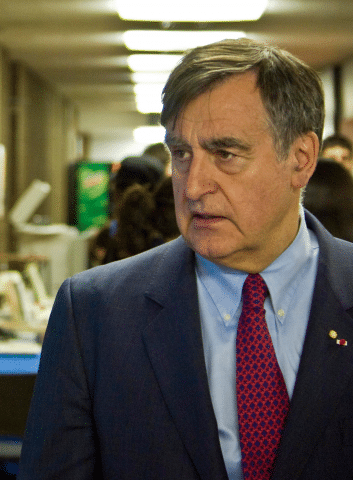On Monday, Québec’s oil and gas industry responded to the Bureau d’audiences publiques sur l’environnement (BAPE) report made public last week. Lucien Bouchard, former Québec Premier turned spokesman for the Québec Oil and Gas Association addressed the media for the first time, acknowledging that the industry’s “new” fracking techniques deserve further scrutiny in order to avoid “mishaps” such as the 19 gas wells that have recently leaked pollution into Quebec’s air and water.
The BAPE commission rightly called for an extensive environmental impact assessment of the effects that shale gas drilling has on air and water quality. While the BAPE did not call for a shale drilling moratorium, Pierre Arcand, Minister of Sustainable Development, Environment and Parks did, however, ban the use of hydraulic fracturing (a.k.a. fracking) for at least a year and a half, and up to 30 months until this destructive technique can be studied further.
Bouchard was rather despondent in his comments, but at times critical of the BAPE, arguing the commission inappropriately applied concerns in places like Alberta to the Québec situation. This is somewhat odd since Québec had not studied the impacts of drilling at all, and therefore the commission was specifically convened to discuss how shale gas is being developed elsewhere in order to ensure its “harmonious development” in Québec.
On the whole, he said the industry accepts the BAPE findings. The fact of the matter is that the former Premier has little choice.
Well over half of Quebecers oppose shale drilling, and more than 128,000 people have signed an online petition calling for a moratorium on shale gas development. Given the public outcry, it is simply not possible for Liberal Premier Jean Charest to stand firm with this fossil fuel industry since his party’s support hovers around 27%.
The BAPE’s most important finding is that the industry has not provided nearly enough information about the environmental, health and safety impacts from shale gas extraction, or the particularly hazardous and destructive hydraulic fracturing (a.k.a. fracking) drilling method, in order to alleviate very real concerns raised about this drilling activity.
On this point, when asked if it was a mistake for Québec to start exploring shale gas without following an in-depth impact assessment covering environmental and health effects, Bouchard bluntly stated:
“Maybe we all forgot that it was something new” …since there was no culture of exploration.
This lack of expertise led to mishaps.
The extreme dangers that come with drilling for dirty fossil fuels using unproven methods like fracking (used in 18 of 31 gas wells in Québec) cannot be understated. Already, gas drilling ‘mishaps’ are destroying the environment and risking public health in the province, where experts found that 19 gas wells have leaked polluting chemicals into the air and water.
In light of the growing body of evidence confirming the dangers of shale gas fracking and drilling accidents, Québec’s politicians ought to stand firm on the fracking moratorium and ban shale gas development in the province as a whole.
Subscribe to our newsletter
Stay up to date with DeSmog news and alerts







